Analysis of Management Accounting Systems in Contemporary Firms
VerifiedAdded on 2022/09/15
|17
|3874
|14
Report
AI Summary
This report undertakes an analysis of managerial accounting systems within contemporary companies, focusing on the practical utilization of such systems for decision-making. It begins by discussing three specific management accounting methods: Total Quality Management (TQM), Balanced Scorecard (BSC), and Activity-Based Costing (ABC). The report then assesses the relevance of these systems to contemporary organizations, drawing evidence from a case study and comparing findings with another article. The analysis reveals that while management accounting systems aim to provide crucial information for strategic, tactical, and operational decisions, their relevance is often challenged by the complexities of modern business environments. The report concludes by examining specific outcomes and lessons learned from the two articles, highlighting factors like communication, data availability, and the need for customized systems. The report emphasizes the importance of adapting management accounting systems to fit the unique needs of each company, while also acknowledging the barriers to successful implementation.
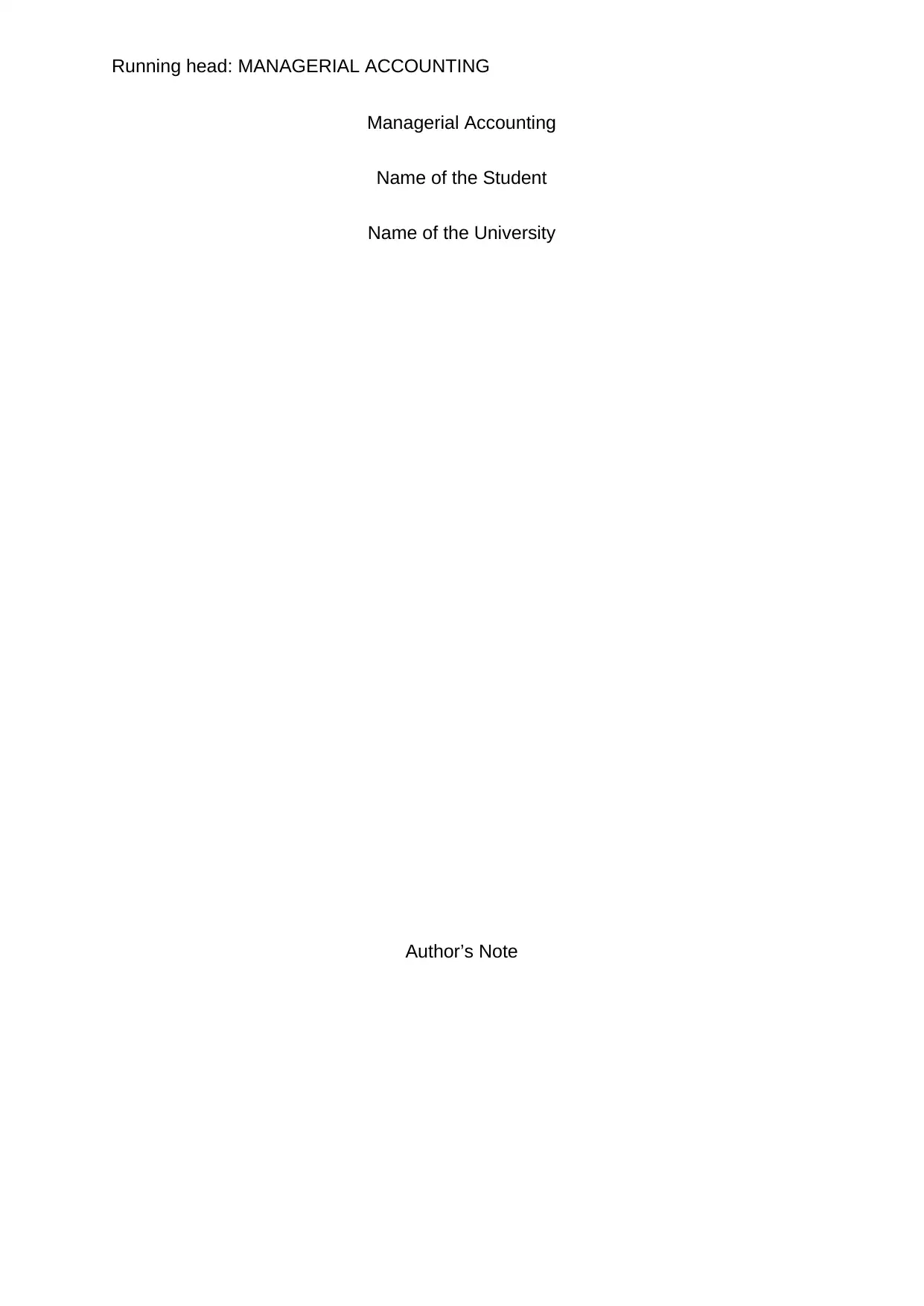
Running head: MANAGERIAL ACCOUNTING
Managerial Accounting
Name of the Student
Name of the University
Author’s Note
Managerial Accounting
Name of the Student
Name of the University
Author’s Note
Paraphrase This Document
Need a fresh take? Get an instant paraphrase of this document with our AI Paraphraser
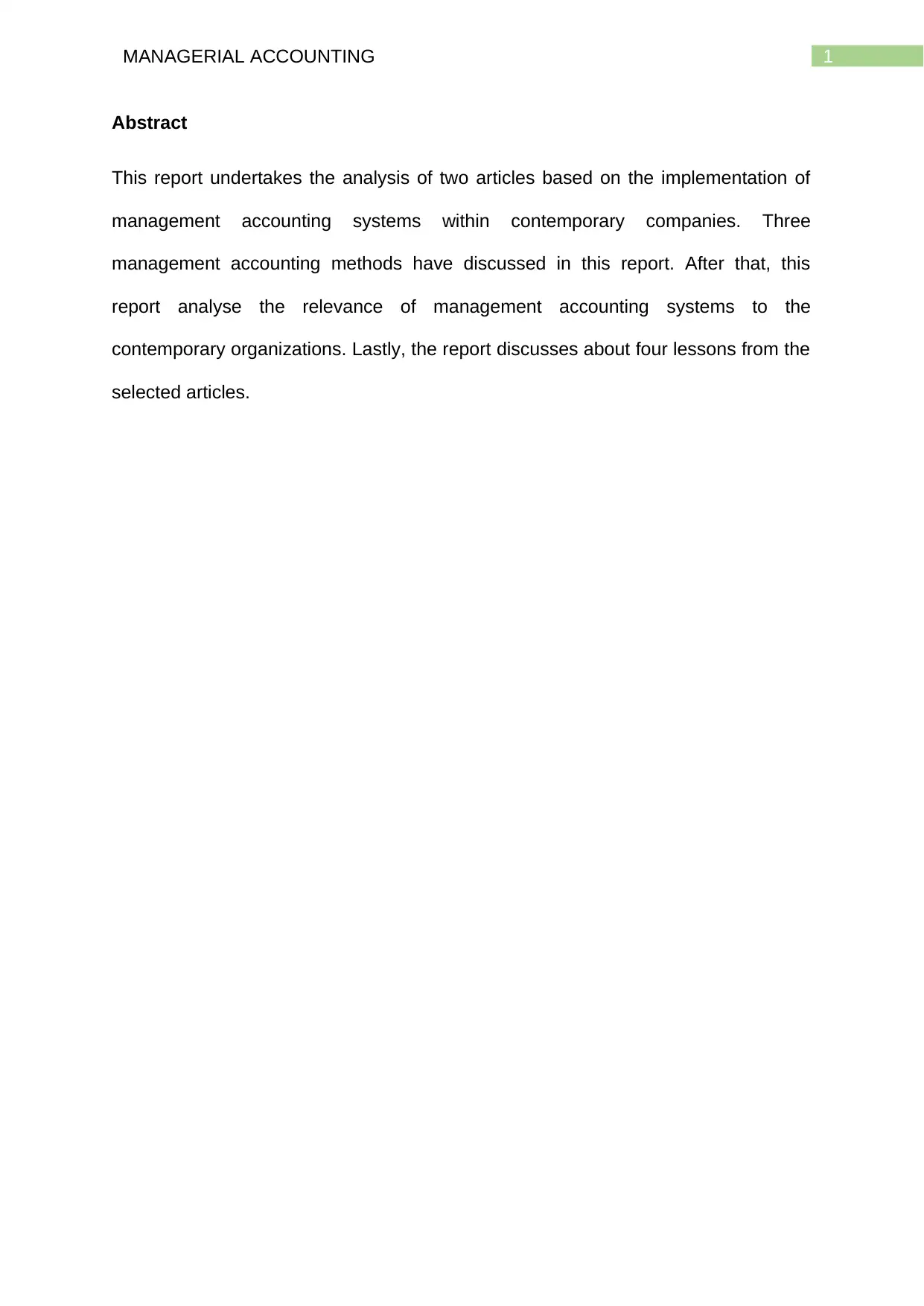
1MANAGERIAL ACCOUNTING
Abstract
This report undertakes the analysis of two articles based on the implementation of
management accounting systems within contemporary companies. Three
management accounting methods have discussed in this report. After that, this
report analyse the relevance of management accounting systems to the
contemporary organizations. Lastly, the report discusses about four lessons from the
selected articles.
Abstract
This report undertakes the analysis of two articles based on the implementation of
management accounting systems within contemporary companies. Three
management accounting methods have discussed in this report. After that, this
report analyse the relevance of management accounting systems to the
contemporary organizations. Lastly, the report discusses about four lessons from the
selected articles.
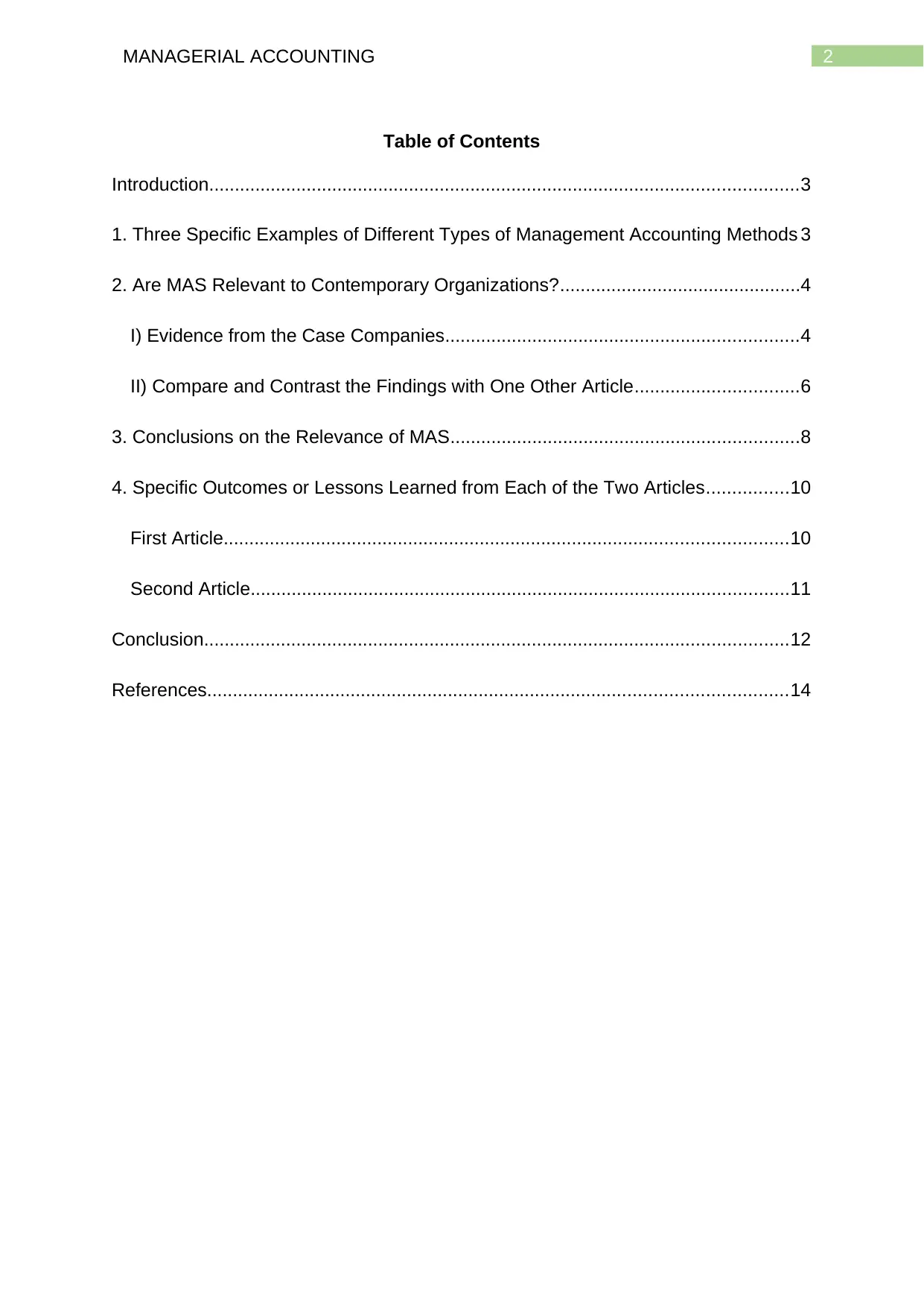
2MANAGERIAL ACCOUNTING
Table of Contents
Introduction...................................................................................................................3
1. Three Specific Examples of Different Types of Management Accounting Methods 3
2. Are MAS Relevant to Contemporary Organizations?...............................................4
I) Evidence from the Case Companies.....................................................................4
II) Compare and Contrast the Findings with One Other Article................................6
3. Conclusions on the Relevance of MAS....................................................................8
4. Specific Outcomes or Lessons Learned from Each of the Two Articles................10
First Article..............................................................................................................10
Second Article.........................................................................................................11
Conclusion..................................................................................................................12
References.................................................................................................................14
Table of Contents
Introduction...................................................................................................................3
1. Three Specific Examples of Different Types of Management Accounting Methods 3
2. Are MAS Relevant to Contemporary Organizations?...............................................4
I) Evidence from the Case Companies.....................................................................4
II) Compare and Contrast the Findings with One Other Article................................6
3. Conclusions on the Relevance of MAS....................................................................8
4. Specific Outcomes or Lessons Learned from Each of the Two Articles................10
First Article..............................................................................................................10
Second Article.........................................................................................................11
Conclusion..................................................................................................................12
References.................................................................................................................14
⊘ This is a preview!⊘
Do you want full access?
Subscribe today to unlock all pages.

Trusted by 1+ million students worldwide
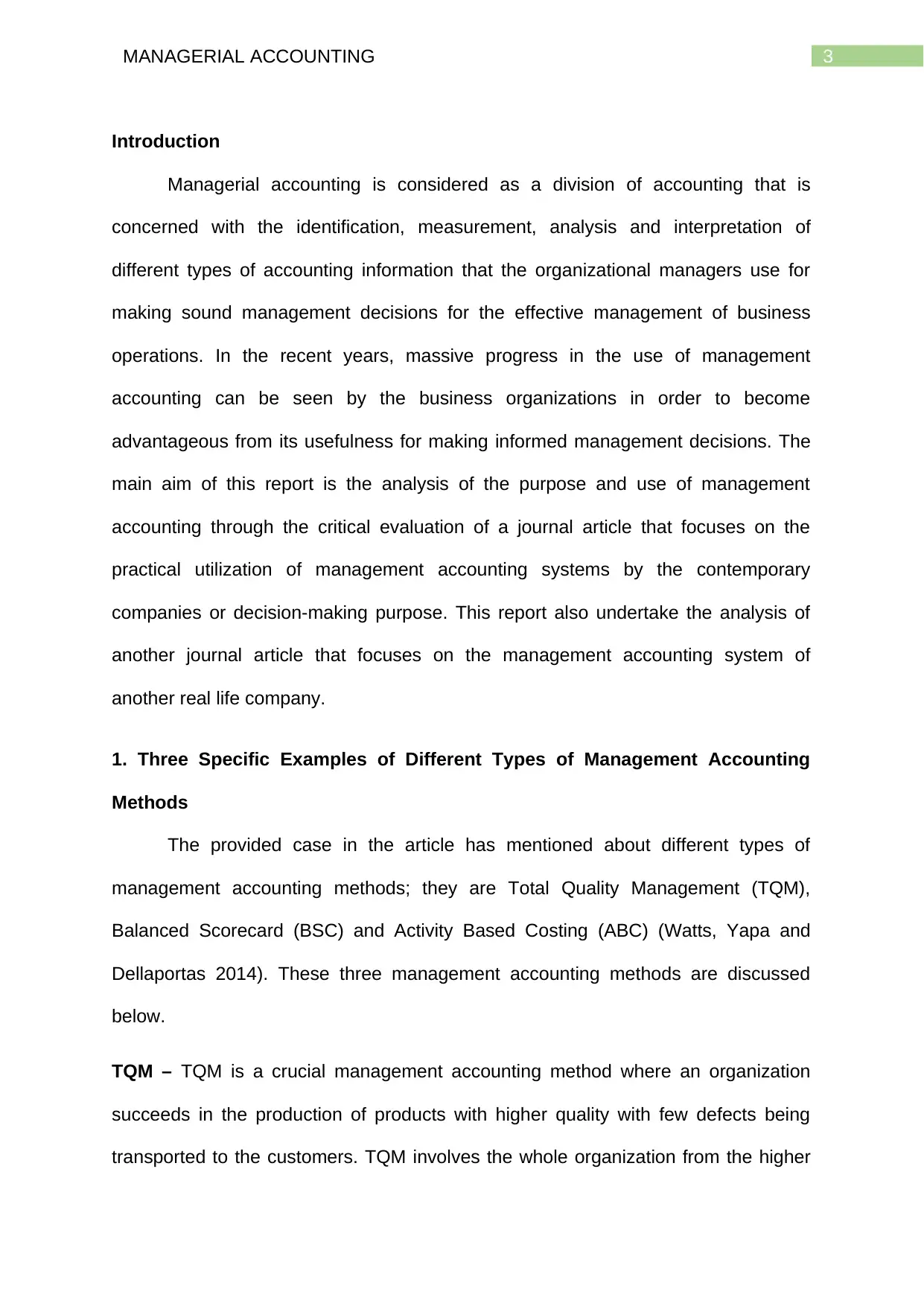
3MANAGERIAL ACCOUNTING
Introduction
Managerial accounting is considered as a division of accounting that is
concerned with the identification, measurement, analysis and interpretation of
different types of accounting information that the organizational managers use for
making sound management decisions for the effective management of business
operations. In the recent years, massive progress in the use of management
accounting can be seen by the business organizations in order to become
advantageous from its usefulness for making informed management decisions. The
main aim of this report is the analysis of the purpose and use of management
accounting through the critical evaluation of a journal article that focuses on the
practical utilization of management accounting systems by the contemporary
companies or decision-making purpose. This report also undertake the analysis of
another journal article that focuses on the management accounting system of
another real life company.
1. Three Specific Examples of Different Types of Management Accounting
Methods
The provided case in the article has mentioned about different types of
management accounting methods; they are Total Quality Management (TQM),
Balanced Scorecard (BSC) and Activity Based Costing (ABC) (Watts, Yapa and
Dellaportas 2014). These three management accounting methods are discussed
below.
TQM – TQM is a crucial management accounting method where an organization
succeeds in the production of products with higher quality with few defects being
transported to the customers. TQM involves the whole organization from the higher
Introduction
Managerial accounting is considered as a division of accounting that is
concerned with the identification, measurement, analysis and interpretation of
different types of accounting information that the organizational managers use for
making sound management decisions for the effective management of business
operations. In the recent years, massive progress in the use of management
accounting can be seen by the business organizations in order to become
advantageous from its usefulness for making informed management decisions. The
main aim of this report is the analysis of the purpose and use of management
accounting through the critical evaluation of a journal article that focuses on the
practical utilization of management accounting systems by the contemporary
companies or decision-making purpose. This report also undertake the analysis of
another journal article that focuses on the management accounting system of
another real life company.
1. Three Specific Examples of Different Types of Management Accounting
Methods
The provided case in the article has mentioned about different types of
management accounting methods; they are Total Quality Management (TQM),
Balanced Scorecard (BSC) and Activity Based Costing (ABC) (Watts, Yapa and
Dellaportas 2014). These three management accounting methods are discussed
below.
TQM – TQM is a crucial management accounting method where an organization
succeeds in the production of products with higher quality with few defects being
transported to the customers. TQM involves the whole organization from the higher
Paraphrase This Document
Need a fresh take? Get an instant paraphrase of this document with our AI Paraphraser
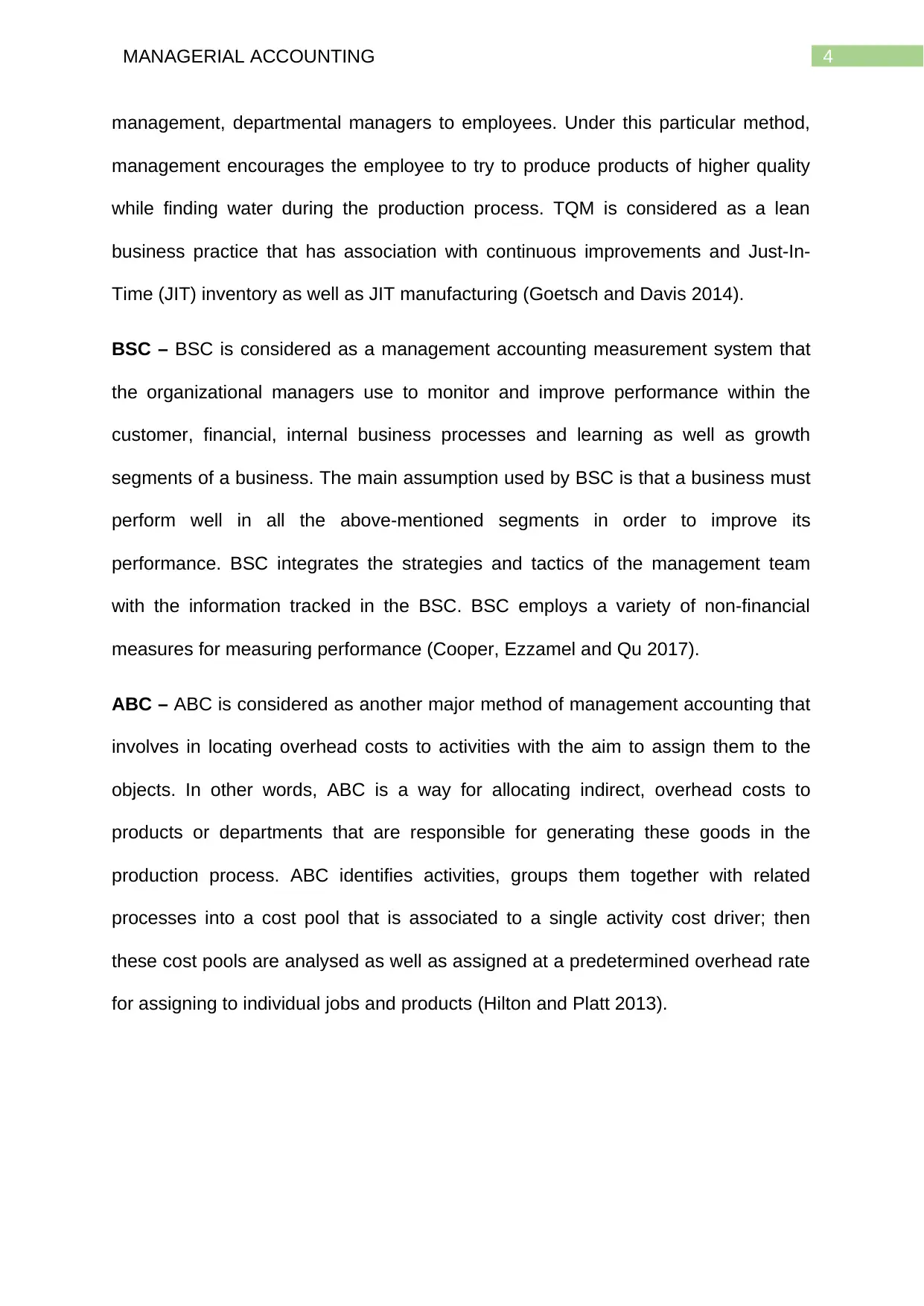
4MANAGERIAL ACCOUNTING
management, departmental managers to employees. Under this particular method,
management encourages the employee to try to produce products of higher quality
while finding water during the production process. TQM is considered as a lean
business practice that has association with continuous improvements and Just-In-
Time (JIT) inventory as well as JIT manufacturing (Goetsch and Davis 2014).
BSC – BSC is considered as a management accounting measurement system that
the organizational managers use to monitor and improve performance within the
customer, financial, internal business processes and learning as well as growth
segments of a business. The main assumption used by BSC is that a business must
perform well in all the above-mentioned segments in order to improve its
performance. BSC integrates the strategies and tactics of the management team
with the information tracked in the BSC. BSC employs a variety of non-financial
measures for measuring performance (Cooper, Ezzamel and Qu 2017).
ABC – ABC is considered as another major method of management accounting that
involves in locating overhead costs to activities with the aim to assign them to the
objects. In other words, ABC is a way for allocating indirect, overhead costs to
products or departments that are responsible for generating these goods in the
production process. ABC identifies activities, groups them together with related
processes into a cost pool that is associated to a single activity cost driver; then
these cost pools are analysed as well as assigned at a predetermined overhead rate
for assigning to individual jobs and products (Hilton and Platt 2013).
management, departmental managers to employees. Under this particular method,
management encourages the employee to try to produce products of higher quality
while finding water during the production process. TQM is considered as a lean
business practice that has association with continuous improvements and Just-In-
Time (JIT) inventory as well as JIT manufacturing (Goetsch and Davis 2014).
BSC – BSC is considered as a management accounting measurement system that
the organizational managers use to monitor and improve performance within the
customer, financial, internal business processes and learning as well as growth
segments of a business. The main assumption used by BSC is that a business must
perform well in all the above-mentioned segments in order to improve its
performance. BSC integrates the strategies and tactics of the management team
with the information tracked in the BSC. BSC employs a variety of non-financial
measures for measuring performance (Cooper, Ezzamel and Qu 2017).
ABC – ABC is considered as another major method of management accounting that
involves in locating overhead costs to activities with the aim to assign them to the
objects. In other words, ABC is a way for allocating indirect, overhead costs to
products or departments that are responsible for generating these goods in the
production process. ABC identifies activities, groups them together with related
processes into a cost pool that is associated to a single activity cost driver; then
these cost pools are analysed as well as assigned at a predetermined overhead rate
for assigning to individual jobs and products (Hilton and Platt 2013).
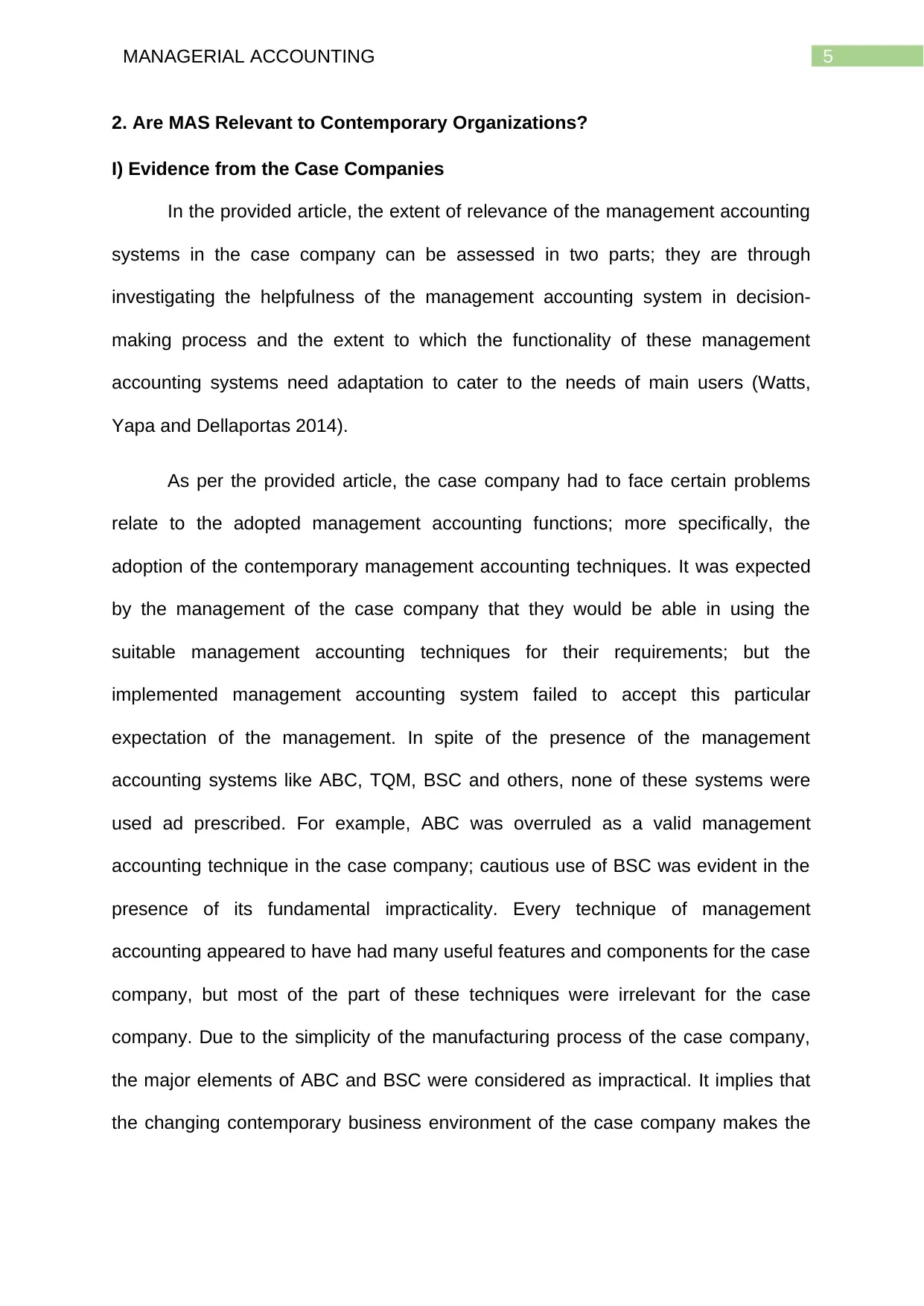
5MANAGERIAL ACCOUNTING
2. Are MAS Relevant to Contemporary Organizations?
I) Evidence from the Case Companies
In the provided article, the extent of relevance of the management accounting
systems in the case company can be assessed in two parts; they are through
investigating the helpfulness of the management accounting system in decision-
making process and the extent to which the functionality of these management
accounting systems need adaptation to cater to the needs of main users (Watts,
Yapa and Dellaportas 2014).
As per the provided article, the case company had to face certain problems
relate to the adopted management accounting functions; more specifically, the
adoption of the contemporary management accounting techniques. It was expected
by the management of the case company that they would be able in using the
suitable management accounting techniques for their requirements; but the
implemented management accounting system failed to accept this particular
expectation of the management. In spite of the presence of the management
accounting systems like ABC, TQM, BSC and others, none of these systems were
used ad prescribed. For example, ABC was overruled as a valid management
accounting technique in the case company; cautious use of BSC was evident in the
presence of its fundamental impracticality. Every technique of management
accounting appeared to have had many useful features and components for the case
company, but most of the part of these techniques were irrelevant for the case
company. Due to the simplicity of the manufacturing process of the case company,
the major elements of ABC and BSC were considered as impractical. It implies that
the changing contemporary business environment of the case company makes the
2. Are MAS Relevant to Contemporary Organizations?
I) Evidence from the Case Companies
In the provided article, the extent of relevance of the management accounting
systems in the case company can be assessed in two parts; they are through
investigating the helpfulness of the management accounting system in decision-
making process and the extent to which the functionality of these management
accounting systems need adaptation to cater to the needs of main users (Watts,
Yapa and Dellaportas 2014).
As per the provided article, the case company had to face certain problems
relate to the adopted management accounting functions; more specifically, the
adoption of the contemporary management accounting techniques. It was expected
by the management of the case company that they would be able in using the
suitable management accounting techniques for their requirements; but the
implemented management accounting system failed to accept this particular
expectation of the management. In spite of the presence of the management
accounting systems like ABC, TQM, BSC and others, none of these systems were
used ad prescribed. For example, ABC was overruled as a valid management
accounting technique in the case company; cautious use of BSC was evident in the
presence of its fundamental impracticality. Every technique of management
accounting appeared to have had many useful features and components for the case
company, but most of the part of these techniques were irrelevant for the case
company. Due to the simplicity of the manufacturing process of the case company,
the major elements of ABC and BSC were considered as impractical. It implies that
the changing contemporary business environment of the case company makes the
⊘ This is a preview!⊘
Do you want full access?
Subscribe today to unlock all pages.

Trusted by 1+ million students worldwide
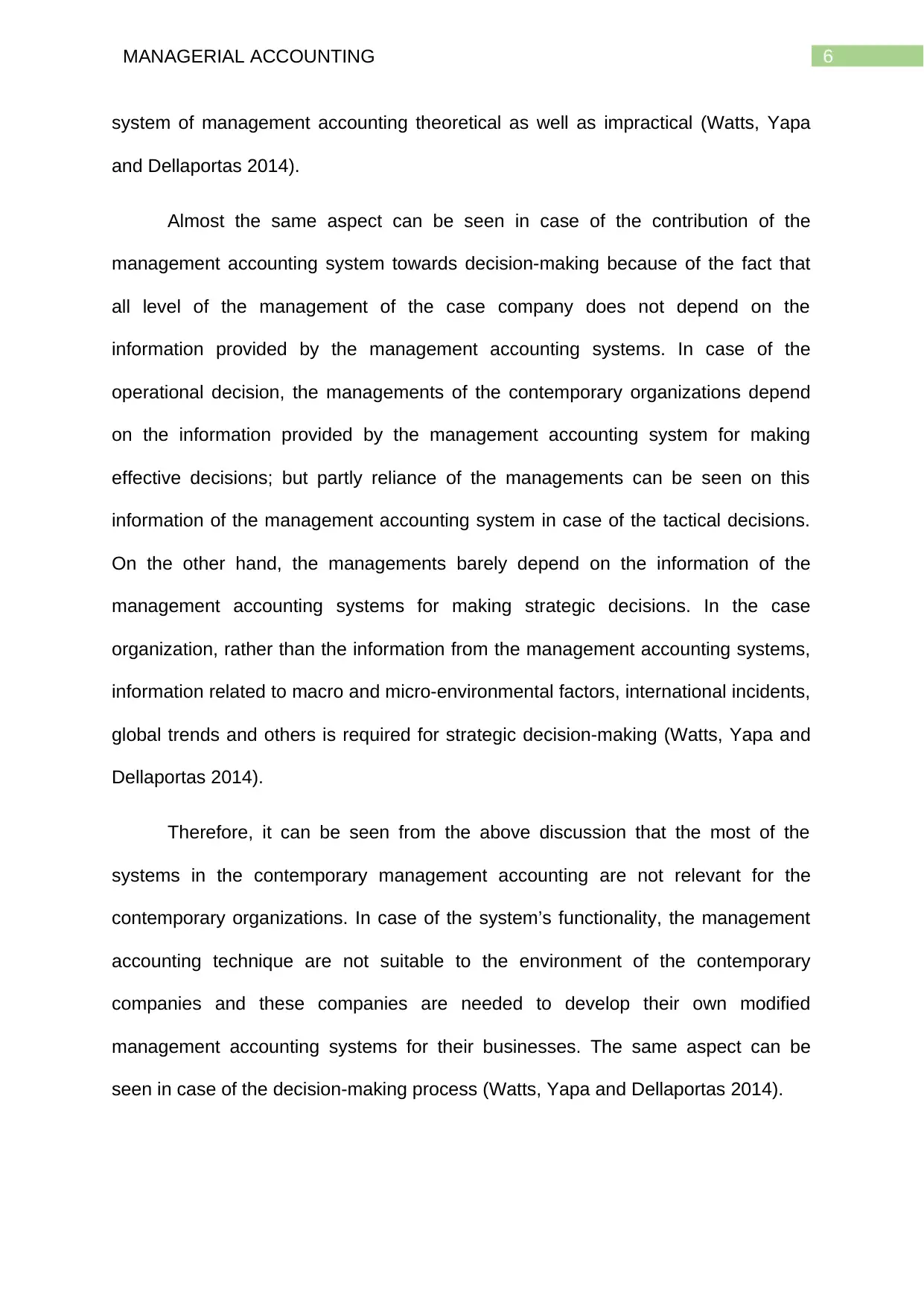
6MANAGERIAL ACCOUNTING
system of management accounting theoretical as well as impractical (Watts, Yapa
and Dellaportas 2014).
Almost the same aspect can be seen in case of the contribution of the
management accounting system towards decision-making because of the fact that
all level of the management of the case company does not depend on the
information provided by the management accounting systems. In case of the
operational decision, the managements of the contemporary organizations depend
on the information provided by the management accounting system for making
effective decisions; but partly reliance of the managements can be seen on this
information of the management accounting system in case of the tactical decisions.
On the other hand, the managements barely depend on the information of the
management accounting systems for making strategic decisions. In the case
organization, rather than the information from the management accounting systems,
information related to macro and micro-environmental factors, international incidents,
global trends and others is required for strategic decision-making (Watts, Yapa and
Dellaportas 2014).
Therefore, it can be seen from the above discussion that the most of the
systems in the contemporary management accounting are not relevant for the
contemporary organizations. In case of the system’s functionality, the management
accounting technique are not suitable to the environment of the contemporary
companies and these companies are needed to develop their own modified
management accounting systems for their businesses. The same aspect can be
seen in case of the decision-making process (Watts, Yapa and Dellaportas 2014).
system of management accounting theoretical as well as impractical (Watts, Yapa
and Dellaportas 2014).
Almost the same aspect can be seen in case of the contribution of the
management accounting system towards decision-making because of the fact that
all level of the management of the case company does not depend on the
information provided by the management accounting systems. In case of the
operational decision, the managements of the contemporary organizations depend
on the information provided by the management accounting system for making
effective decisions; but partly reliance of the managements can be seen on this
information of the management accounting system in case of the tactical decisions.
On the other hand, the managements barely depend on the information of the
management accounting systems for making strategic decisions. In the case
organization, rather than the information from the management accounting systems,
information related to macro and micro-environmental factors, international incidents,
global trends and others is required for strategic decision-making (Watts, Yapa and
Dellaportas 2014).
Therefore, it can be seen from the above discussion that the most of the
systems in the contemporary management accounting are not relevant for the
contemporary organizations. In case of the system’s functionality, the management
accounting technique are not suitable to the environment of the contemporary
companies and these companies are needed to develop their own modified
management accounting systems for their businesses. The same aspect can be
seen in case of the decision-making process (Watts, Yapa and Dellaportas 2014).
Paraphrase This Document
Need a fresh take? Get an instant paraphrase of this document with our AI Paraphraser
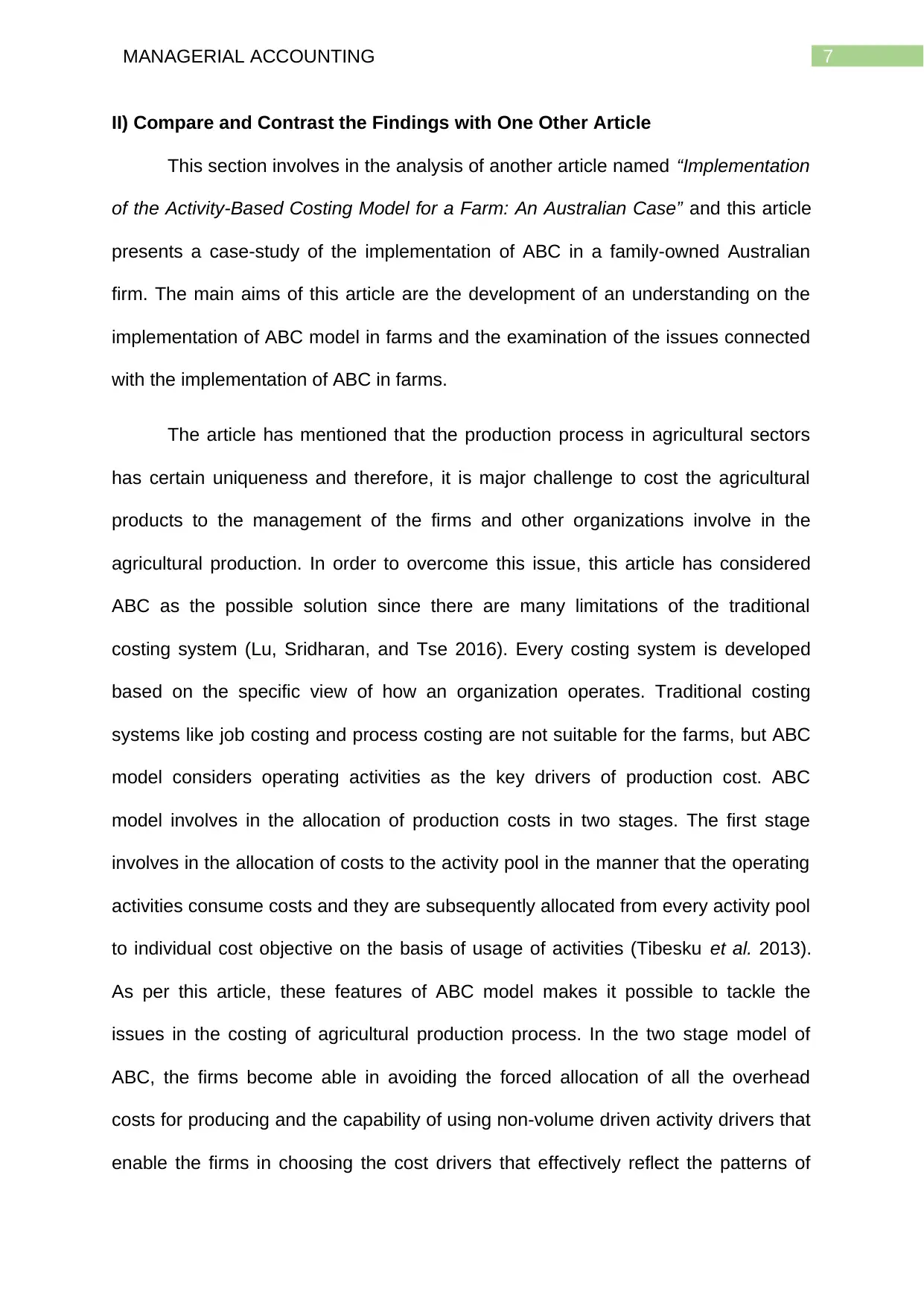
7MANAGERIAL ACCOUNTING
II) Compare and Contrast the Findings with One Other Article
This section involves in the analysis of another article named “Implementation
of the Activity-Based Costing Model for a Farm: An Australian Case” and this article
presents a case-study of the implementation of ABC in a family-owned Australian
firm. The main aims of this article are the development of an understanding on the
implementation of ABC model in farms and the examination of the issues connected
with the implementation of ABC in farms.
The article has mentioned that the production process in agricultural sectors
has certain uniqueness and therefore, it is major challenge to cost the agricultural
products to the management of the firms and other organizations involve in the
agricultural production. In order to overcome this issue, this article has considered
ABC as the possible solution since there are many limitations of the traditional
costing system (Lu, Sridharan, and Tse 2016). Every costing system is developed
based on the specific view of how an organization operates. Traditional costing
systems like job costing and process costing are not suitable for the farms, but ABC
model considers operating activities as the key drivers of production cost. ABC
model involves in the allocation of production costs in two stages. The first stage
involves in the allocation of costs to the activity pool in the manner that the operating
activities consume costs and they are subsequently allocated from every activity pool
to individual cost objective on the basis of usage of activities (Tibesku et al. 2013).
As per this article, these features of ABC model makes it possible to tackle the
issues in the costing of agricultural production process. In the two stage model of
ABC, the firms become able in avoiding the forced allocation of all the overhead
costs for producing and the capability of using non-volume driven activity drivers that
enable the firms in choosing the cost drivers that effectively reflect the patterns of
II) Compare and Contrast the Findings with One Other Article
This section involves in the analysis of another article named “Implementation
of the Activity-Based Costing Model for a Farm: An Australian Case” and this article
presents a case-study of the implementation of ABC in a family-owned Australian
firm. The main aims of this article are the development of an understanding on the
implementation of ABC model in farms and the examination of the issues connected
with the implementation of ABC in farms.
The article has mentioned that the production process in agricultural sectors
has certain uniqueness and therefore, it is major challenge to cost the agricultural
products to the management of the firms and other organizations involve in the
agricultural production. In order to overcome this issue, this article has considered
ABC as the possible solution since there are many limitations of the traditional
costing system (Lu, Sridharan, and Tse 2016). Every costing system is developed
based on the specific view of how an organization operates. Traditional costing
systems like job costing and process costing are not suitable for the farms, but ABC
model considers operating activities as the key drivers of production cost. ABC
model involves in the allocation of production costs in two stages. The first stage
involves in the allocation of costs to the activity pool in the manner that the operating
activities consume costs and they are subsequently allocated from every activity pool
to individual cost objective on the basis of usage of activities (Tibesku et al. 2013).
As per this article, these features of ABC model makes it possible to tackle the
issues in the costing of agricultural production process. In the two stage model of
ABC, the firms become able in avoiding the forced allocation of all the overhead
costs for producing and the capability of using non-volume driven activity drivers that
enable the firms in choosing the cost drivers that effectively reflect the patterns of
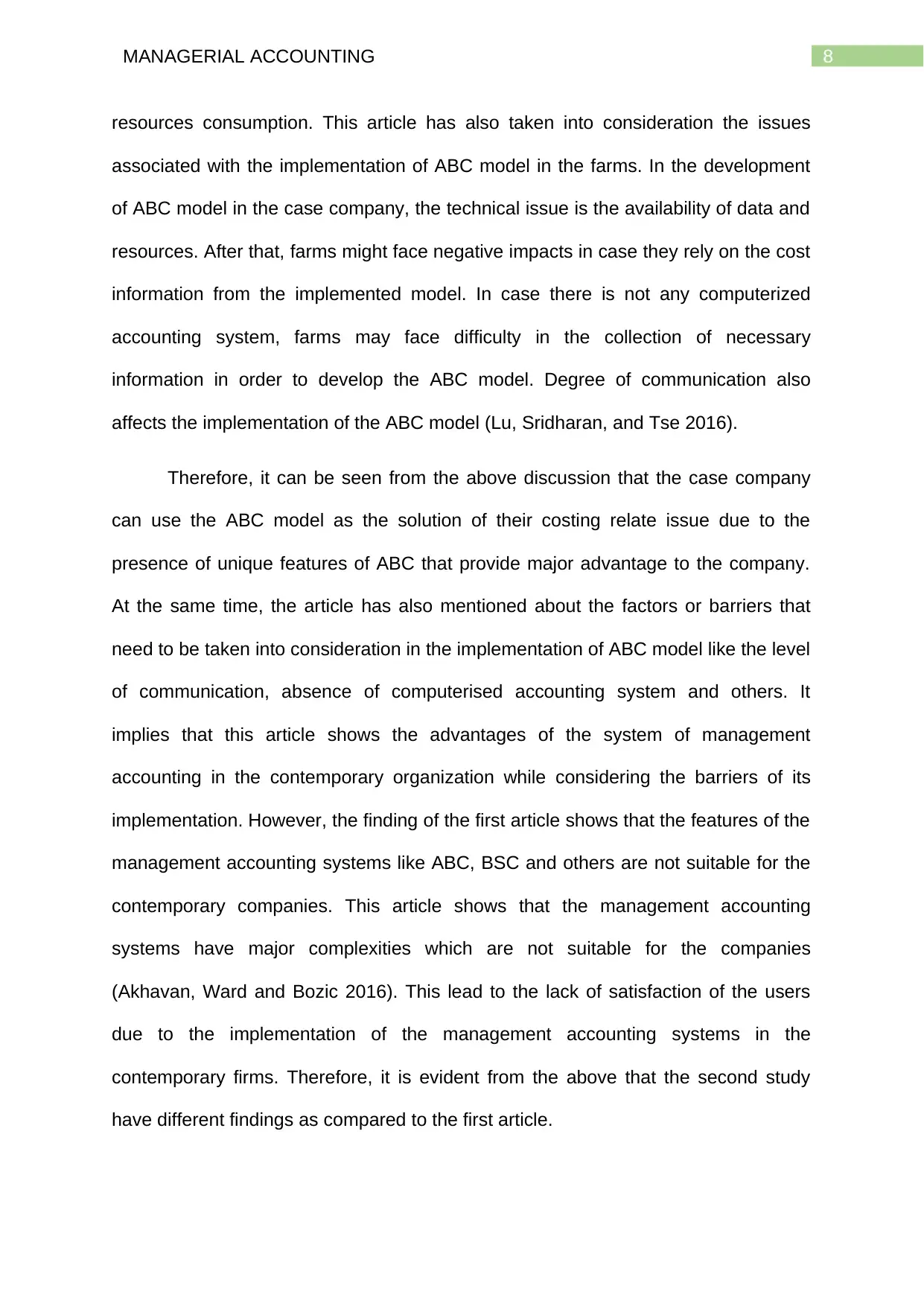
8MANAGERIAL ACCOUNTING
resources consumption. This article has also taken into consideration the issues
associated with the implementation of ABC model in the farms. In the development
of ABC model in the case company, the technical issue is the availability of data and
resources. After that, farms might face negative impacts in case they rely on the cost
information from the implemented model. In case there is not any computerized
accounting system, farms may face difficulty in the collection of necessary
information in order to develop the ABC model. Degree of communication also
affects the implementation of the ABC model (Lu, Sridharan, and Tse 2016).
Therefore, it can be seen from the above discussion that the case company
can use the ABC model as the solution of their costing relate issue due to the
presence of unique features of ABC that provide major advantage to the company.
At the same time, the article has also mentioned about the factors or barriers that
need to be taken into consideration in the implementation of ABC model like the level
of communication, absence of computerised accounting system and others. It
implies that this article shows the advantages of the system of management
accounting in the contemporary organization while considering the barriers of its
implementation. However, the finding of the first article shows that the features of the
management accounting systems like ABC, BSC and others are not suitable for the
contemporary companies. This article shows that the management accounting
systems have major complexities which are not suitable for the companies
(Akhavan, Ward and Bozic 2016). This lead to the lack of satisfaction of the users
due to the implementation of the management accounting systems in the
contemporary firms. Therefore, it is evident from the above that the second study
have different findings as compared to the first article.
resources consumption. This article has also taken into consideration the issues
associated with the implementation of ABC model in the farms. In the development
of ABC model in the case company, the technical issue is the availability of data and
resources. After that, farms might face negative impacts in case they rely on the cost
information from the implemented model. In case there is not any computerized
accounting system, farms may face difficulty in the collection of necessary
information in order to develop the ABC model. Degree of communication also
affects the implementation of the ABC model (Lu, Sridharan, and Tse 2016).
Therefore, it can be seen from the above discussion that the case company
can use the ABC model as the solution of their costing relate issue due to the
presence of unique features of ABC that provide major advantage to the company.
At the same time, the article has also mentioned about the factors or barriers that
need to be taken into consideration in the implementation of ABC model like the level
of communication, absence of computerised accounting system and others. It
implies that this article shows the advantages of the system of management
accounting in the contemporary organization while considering the barriers of its
implementation. However, the finding of the first article shows that the features of the
management accounting systems like ABC, BSC and others are not suitable for the
contemporary companies. This article shows that the management accounting
systems have major complexities which are not suitable for the companies
(Akhavan, Ward and Bozic 2016). This lead to the lack of satisfaction of the users
due to the implementation of the management accounting systems in the
contemporary firms. Therefore, it is evident from the above that the second study
have different findings as compared to the first article.
⊘ This is a preview!⊘
Do you want full access?
Subscribe today to unlock all pages.

Trusted by 1+ million students worldwide
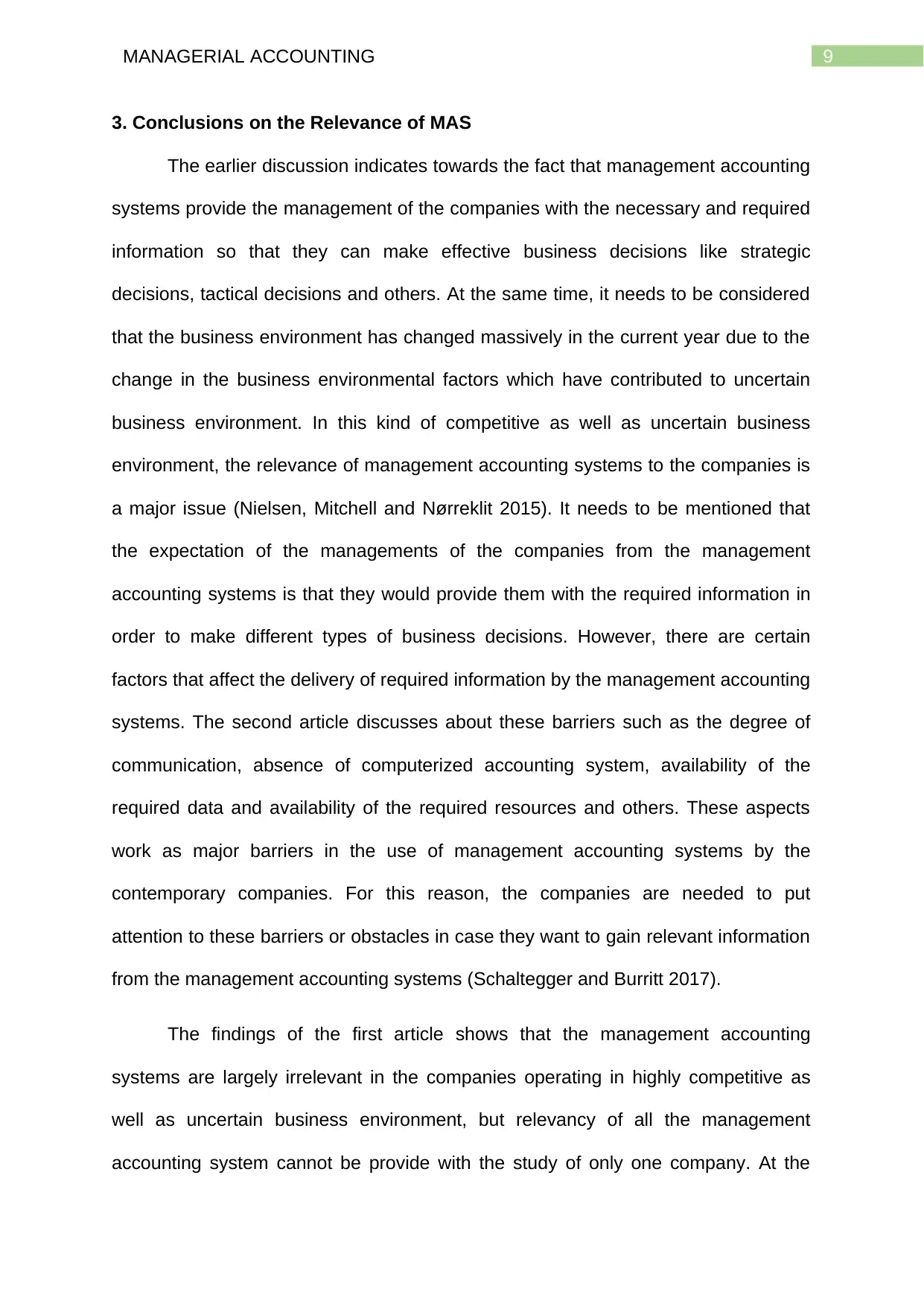
9MANAGERIAL ACCOUNTING
3. Conclusions on the Relevance of MAS
The earlier discussion indicates towards the fact that management accounting
systems provide the management of the companies with the necessary and required
information so that they can make effective business decisions like strategic
decisions, tactical decisions and others. At the same time, it needs to be considered
that the business environment has changed massively in the current year due to the
change in the business environmental factors which have contributed to uncertain
business environment. In this kind of competitive as well as uncertain business
environment, the relevance of management accounting systems to the companies is
a major issue (Nielsen, Mitchell and Nørreklit 2015). It needs to be mentioned that
the expectation of the managements of the companies from the management
accounting systems is that they would provide them with the required information in
order to make different types of business decisions. However, there are certain
factors that affect the delivery of required information by the management accounting
systems. The second article discusses about these barriers such as the degree of
communication, absence of computerized accounting system, availability of the
required data and availability of the required resources and others. These aspects
work as major barriers in the use of management accounting systems by the
contemporary companies. For this reason, the companies are needed to put
attention to these barriers or obstacles in case they want to gain relevant information
from the management accounting systems (Schaltegger and Burritt 2017).
The findings of the first article shows that the management accounting
systems are largely irrelevant in the companies operating in highly competitive as
well as uncertain business environment, but relevancy of all the management
accounting system cannot be provide with the study of only one company. At the
3. Conclusions on the Relevance of MAS
The earlier discussion indicates towards the fact that management accounting
systems provide the management of the companies with the necessary and required
information so that they can make effective business decisions like strategic
decisions, tactical decisions and others. At the same time, it needs to be considered
that the business environment has changed massively in the current year due to the
change in the business environmental factors which have contributed to uncertain
business environment. In this kind of competitive as well as uncertain business
environment, the relevance of management accounting systems to the companies is
a major issue (Nielsen, Mitchell and Nørreklit 2015). It needs to be mentioned that
the expectation of the managements of the companies from the management
accounting systems is that they would provide them with the required information in
order to make different types of business decisions. However, there are certain
factors that affect the delivery of required information by the management accounting
systems. The second article discusses about these barriers such as the degree of
communication, absence of computerized accounting system, availability of the
required data and availability of the required resources and others. These aspects
work as major barriers in the use of management accounting systems by the
contemporary companies. For this reason, the companies are needed to put
attention to these barriers or obstacles in case they want to gain relevant information
from the management accounting systems (Schaltegger and Burritt 2017).
The findings of the first article shows that the management accounting
systems are largely irrelevant in the companies operating in highly competitive as
well as uncertain business environment, but relevancy of all the management
accounting system cannot be provide with the study of only one company. At the
Paraphrase This Document
Need a fresh take? Get an instant paraphrase of this document with our AI Paraphraser
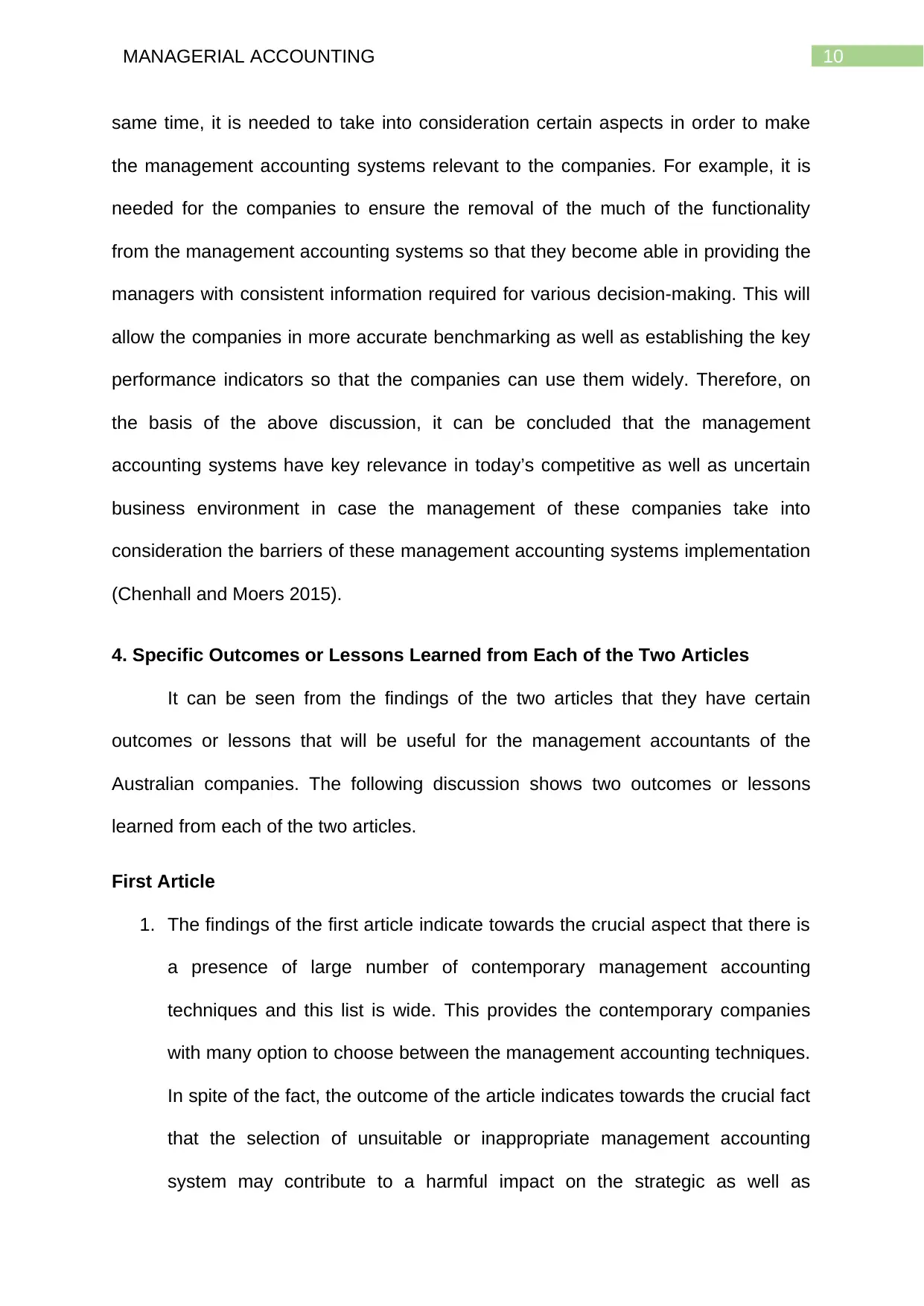
10MANAGERIAL ACCOUNTING
same time, it is needed to take into consideration certain aspects in order to make
the management accounting systems relevant to the companies. For example, it is
needed for the companies to ensure the removal of the much of the functionality
from the management accounting systems so that they become able in providing the
managers with consistent information required for various decision-making. This will
allow the companies in more accurate benchmarking as well as establishing the key
performance indicators so that the companies can use them widely. Therefore, on
the basis of the above discussion, it can be concluded that the management
accounting systems have key relevance in today’s competitive as well as uncertain
business environment in case the management of these companies take into
consideration the barriers of these management accounting systems implementation
(Chenhall and Moers 2015).
4. Specific Outcomes or Lessons Learned from Each of the Two Articles
It can be seen from the findings of the two articles that they have certain
outcomes or lessons that will be useful for the management accountants of the
Australian companies. The following discussion shows two outcomes or lessons
learned from each of the two articles.
First Article
1. The findings of the first article indicate towards the crucial aspect that there is
a presence of large number of contemporary management accounting
techniques and this list is wide. This provides the contemporary companies
with many option to choose between the management accounting techniques.
In spite of the fact, the outcome of the article indicates towards the crucial fact
that the selection of unsuitable or inappropriate management accounting
system may contribute to a harmful impact on the strategic as well as
same time, it is needed to take into consideration certain aspects in order to make
the management accounting systems relevant to the companies. For example, it is
needed for the companies to ensure the removal of the much of the functionality
from the management accounting systems so that they become able in providing the
managers with consistent information required for various decision-making. This will
allow the companies in more accurate benchmarking as well as establishing the key
performance indicators so that the companies can use them widely. Therefore, on
the basis of the above discussion, it can be concluded that the management
accounting systems have key relevance in today’s competitive as well as uncertain
business environment in case the management of these companies take into
consideration the barriers of these management accounting systems implementation
(Chenhall and Moers 2015).
4. Specific Outcomes or Lessons Learned from Each of the Two Articles
It can be seen from the findings of the two articles that they have certain
outcomes or lessons that will be useful for the management accountants of the
Australian companies. The following discussion shows two outcomes or lessons
learned from each of the two articles.
First Article
1. The findings of the first article indicate towards the crucial aspect that there is
a presence of large number of contemporary management accounting
techniques and this list is wide. This provides the contemporary companies
with many option to choose between the management accounting techniques.
In spite of the fact, the outcome of the article indicates towards the crucial fact
that the selection of unsuitable or inappropriate management accounting
system may contribute to a harmful impact on the strategic as well as
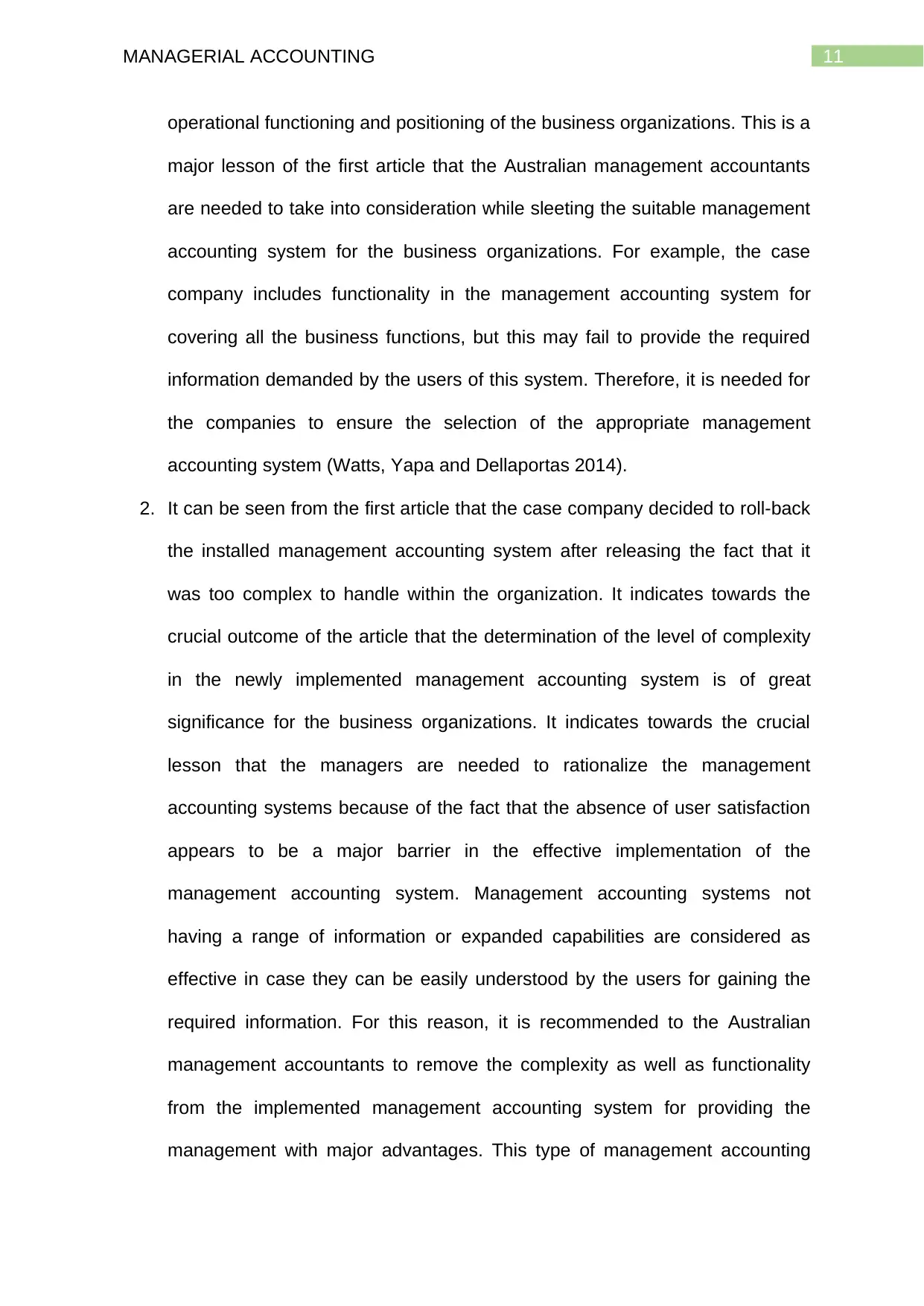
11MANAGERIAL ACCOUNTING
operational functioning and positioning of the business organizations. This is a
major lesson of the first article that the Australian management accountants
are needed to take into consideration while sleeting the suitable management
accounting system for the business organizations. For example, the case
company includes functionality in the management accounting system for
covering all the business functions, but this may fail to provide the required
information demanded by the users of this system. Therefore, it is needed for
the companies to ensure the selection of the appropriate management
accounting system (Watts, Yapa and Dellaportas 2014).
2. It can be seen from the first article that the case company decided to roll-back
the installed management accounting system after releasing the fact that it
was too complex to handle within the organization. It indicates towards the
crucial outcome of the article that the determination of the level of complexity
in the newly implemented management accounting system is of great
significance for the business organizations. It indicates towards the crucial
lesson that the managers are needed to rationalize the management
accounting systems because of the fact that the absence of user satisfaction
appears to be a major barrier in the effective implementation of the
management accounting system. Management accounting systems not
having a range of information or expanded capabilities are considered as
effective in case they can be easily understood by the users for gaining the
required information. For this reason, it is recommended to the Australian
management accountants to remove the complexity as well as functionality
from the implemented management accounting system for providing the
management with major advantages. This type of management accounting
operational functioning and positioning of the business organizations. This is a
major lesson of the first article that the Australian management accountants
are needed to take into consideration while sleeting the suitable management
accounting system for the business organizations. For example, the case
company includes functionality in the management accounting system for
covering all the business functions, but this may fail to provide the required
information demanded by the users of this system. Therefore, it is needed for
the companies to ensure the selection of the appropriate management
accounting system (Watts, Yapa and Dellaportas 2014).
2. It can be seen from the first article that the case company decided to roll-back
the installed management accounting system after releasing the fact that it
was too complex to handle within the organization. It indicates towards the
crucial outcome of the article that the determination of the level of complexity
in the newly implemented management accounting system is of great
significance for the business organizations. It indicates towards the crucial
lesson that the managers are needed to rationalize the management
accounting systems because of the fact that the absence of user satisfaction
appears to be a major barrier in the effective implementation of the
management accounting system. Management accounting systems not
having a range of information or expanded capabilities are considered as
effective in case they can be easily understood by the users for gaining the
required information. For this reason, it is recommended to the Australian
management accountants to remove the complexity as well as functionality
from the implemented management accounting system for providing the
management with major advantages. This type of management accounting
⊘ This is a preview!⊘
Do you want full access?
Subscribe today to unlock all pages.

Trusted by 1+ million students worldwide
1 out of 17
Related Documents
Your All-in-One AI-Powered Toolkit for Academic Success.
+13062052269
info@desklib.com
Available 24*7 on WhatsApp / Email
![[object Object]](/_next/static/media/star-bottom.7253800d.svg)
Unlock your academic potential
Copyright © 2020–2026 A2Z Services. All Rights Reserved. Developed and managed by ZUCOL.





